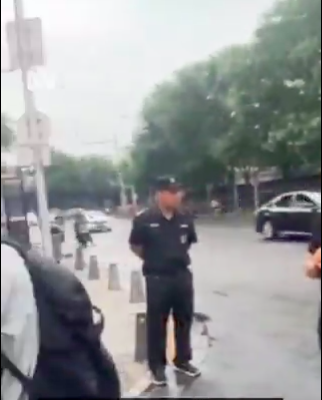On July 14, during the visit of Australian Prime Minister Albanese to China, a journalist from the Australian Broadcasting Corporation (ABC) was intercepted and briefly detained by several security personnel while filming in the Gulou Street area in Beijing. It was not until the Australian Embassy in China intervened that the journalist was allowed to leave. The incident has attracted public attention. Scholars pointed out that China’s monitoring and intervention in foreign media have become increasingly normalized, reflecting a comprehensive upgrade in information control.
According to footage from ABC News, journalist Stephen Dziedzic was filming scenes of daily life in the old streets near the Gulou area in Dongcheng District, Beijing when he was suddenly surrounded by several security personnel in uniform, who demanded that he stop filming immediately, claiming “this area is off-limits for filming” and accusing him of illegality. A verbal confrontation ensued at the scene. ABC stated that Stephen was “temporarily detained” but not formally charged.
In front of the camera, Stephen stated, “We were interrupted by several uniformed security personnel, whom we believe are local government patrol officers. According to our understanding, the Australian Embassy in China has already communicated and informed the Chinese Ministry of Foreign Affairs. We have valid visas and filming permits, but it seems this information did not reach the grassroots level. As a result, we were surrounded by security personnel and unable to continue filming.”
The footage showed multiple uniformed and plainclothes security guards standing around the journalist, creating a blockade, with blank expressions and no response.
A retired employee of a neighborhood committee in Chaoyang District in Beijing, Xia Wei (pseudonym), revealed to Dajiyuan that local police stations have been requesting grassroots personnel in recent years to pay attention to the activities of foreigners in the community, especially when they are carrying cameras or recording equipment, urging heightened vigilance.
She said, “It depends on what the foreigners are filming. Filming things like sewers, dilapidated houses, beggars, or disabled individuals is not allowed, and must be reported to the police station immediately, without letting them go.”
Xia Wei added that her daughter, who works in the street office, also received similar notifications. When encountering foreigners filming, they must inquire about their identity, affiliated media, and filming purpose. “Now, it’s like ‘all the people are soldiers’ in Beijing, feeling similar to the ‘sent-down youth’ period in our childhood.”
In contrast to the current high level of alertness, a freelance media worker in Beijing, Ms. Zhang (pseudonym), recalled during an interview with Dajiyuan that in the early days of China’s reform and opening up in the 1970s and 1980s, foreign media filming on the streets often attracted crowds, but most people believed it was “government arranged” and rarely intervened actively.
She said, “Even the public security officers seldom intervened in the past. It’s different now; even residential security guards will approach journalists filming, demanding them to delete materials.”
Although Chinese law does not explicitly prohibit foreign journalists from filming in public places, several observers pointed out that in practice, foreign media journalists often face “temporary intervention” or “arbitrary restrictions.”
A scholar familiar with media policies, Zhang Ming (pseudonym), stated in an interview that the Gulou area has become a key area for authorities’ stability maintenance in recent years, making it easy for foreign media filming there to “step on landmines.”
“We’ve heard of many foreign media journalists encountering tailing, inspections, expulsion, or even forced cessation of interviews in places like Zhongnanhai, the State Bureau of Letters and Calls, Inner Mongolia, Xinjiang, where sometimes even local Chinese media struggle. The government does not provide reasons, and grassroots security personnel also lack professional training, making it increasingly difficult for foreign media to conduct interviews in China.”
Media policy researcher Song Xia (pseudonym) stated that since the implementation of the new version of the “Anti-Spying Law” on July 1, 2023, the government’s attitude towards foreign media has changed.
“The authorities equate public opinion security with national security, and their strategy towards foreign media has shifted from ‘managing and utilizing’ to ‘preventing and restricting.’ Even filming places like Gulou and Qianmen, grassroots personnel may see it as a security risk and take action.”
Song Xia emphasized that China is highly vigilant towards any unofficial filming activities, with “unauthorized filming often seen as disrupting order and even suspected of espionage. The space for foreign media interviews in China continues to shrink.”
A veteran media worker focusing on Sino-Australian relations, Ms. Zhang, believes that despite increased high-level interactions between the two countries, the Chinese Communist Party’s vigilance towards foreign media has not eased.
She said, “Foreign journalists cannot assume that their content is not sensitive and thus not problematic. In the eyes of the authorities, what’s sensitive is your identity, not what you’re covering.”
Zhang also mentioned that many local officials and security forces equate “foreign journalists” with “hostile forces” or “rumor-spreading media,” making procedures like “first control, then report, and finally release” a common practice.
This incident occurred during the meeting between Australian Prime Minister Albanese and Chinese Communist Party leader Xi Jinping and Premier Li Keqiang. Zhang believes that while there is increased high-level diplomatic engagement on the surface, the institutional suppression of foreign media by the Chinese authorities may once again raise concerns in Australia about restrictions on press freedom by China.

